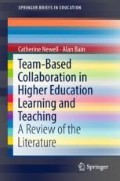Abstract
This chapter goes beyond processes of interpersonal interaction and problem-solving to examine commentary claims and empirical research on the sharing and building of knowledge in groups or teams and its importance for collaboration. The following studies illustrate the range and complexity of social and cognitive processes and strategies involved in collaboration and their interaction with problem domain tasks and knowledge building. They connect team knowledge building to the structured CPS described in the previous chapters. They highlight the need for not just shared processes, but shared professional language to communicate in the problem domain and build shared mental models.
Access this chapter
Tax calculation will be finalised at checkout
Purchases are for personal use only
References
Bain, A., Lancaster, J., & Zundans, L. (2009). Pattern language development in the preparation of inclusive educators. International Journal of the Teacher and Learning in Higher Education, 20(3), 336–349. (ERIC Document reproduction Service No. EJ869320).
Ciampaglia, B. I. (2010). Analysis of school-wide supports and barriers to CPS teams: Fidelity in applying the process. A thesis submitted in fulfilment of the requirements of the degree of Doctor of Philosophy at Graduate School of the University of Massachusetts, May 2010. UMI Number: 3409557.
Fransen, J., Kirschner, P. A., & Erkens, G. (2011). Mediating team effectiveness in the context of collaborative learning: The importance of team and task awareness. Computers in Human Behaviour, 27(2011), 1103–1113. https://doi.org/10.1016/j.chb.2010.05.017.
Hmelo-Silver, C. E., & Barrows, H. S. (2008). Facilitating collaborative knowledge building. Cognition and Instruction, 26(1), 48–94. https://doi.org/10.1080/07370000701798495.
Kovaleski, J. F., & Glew, M. C. (2006). Bringing instructional support teams to scale: Implications of the Pennsylvania experience. Remedial and Special Education, 27(1), 16–25. https://doi.org/10.1177/07419325060270010301.
Nokes-Malach, T. J., Meade, M. L., & Morrow, D. G. (2012). The effect of expertise on collaborative problem solving. Thinking & Reasoning, 18(1), 32–58. https://doi.org/10.1080/13546783.2011.642206.
OECD. (2017). PISA 2015 collaborative problem-solving framework. In PISA 2015 Assessment and Analytical Framework: Science, Reading, Mathematic, Financial Literacy and Collaborative Problem Solving (pp. 131–188). Paris: OECD Publishing. https://doi.org/10.1787/9789264281820-8-en.
Rosen, M. A., Salas, E., Fiore, S. M., Pavlas, D., & Lum, H. C. (2009). Team cognition and external representations: A framework and propositions for supporting collaborative problem solving. Paper presented at the Human Factors and Ergonomics Society Annual Meeting, Vol. 53, pp. 1295–1299. https://doi.org/10.1177/154193120905301828.
Salisbury, C. L., Evans, I. M., & Palombaro, M. M. (1997). Collaborative problem-solving to promote the inclusion of children with significant disabilities in primary grades. Exceptional Children, 63(2), 195–209. https://doi.org/10.1177/001440299706300204.
Stoyanova, N., & Kommers, P.(2002). Concept mapping as a medium of shared cognition in computer-supported collaborative problem solving. Journal of Interactive Learning Research, 13(1/2), 111–133. Retrieved from http://www.editlib.org/p/10783/.
Zundans-Fraser, L. A. (2014). Self-organisation in course design: A collaborative, theory-based approach to course development in inclusive education (Unpublished doctoral dissertation). Charles Sturt University.
Author information
Authors and Affiliations
Corresponding author
Rights and permissions
Copyright information
© 2018 The Author(s), under exclusive license to Springer Nature Singapore Pte Ltd.
About this chapter
Cite this chapter
Newell, C., Bain, A. (2018). Building Shared Mental Models. In: Team-Based Collaboration in Higher Education Learning and Teaching. SpringerBriefs in Education. Springer, Singapore. https://doi.org/10.1007/978-981-13-1855-9_5
Download citation
DOI: https://doi.org/10.1007/978-981-13-1855-9_5
Published:
Publisher Name: Springer, Singapore
Print ISBN: 978-981-13-1854-2
Online ISBN: 978-981-13-1855-9
eBook Packages: EducationEducation (R0)

